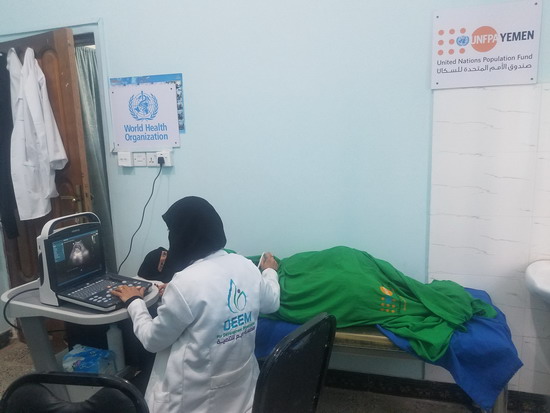 Health worker performing ultrasound at Al-Wadhah health centre in Taiz
Health worker performing ultrasound at Al-Wadhah health centre in Taiz
27 April 2020 – Yemen was struggling with a poor reproductive health system even before the situation was worsened by the war which pushed millions of people into further vulnerability and the health system into near collapse. In 2020, 3.75 million women and girls of reproductive age and 600 000 who would become pregnant or deliver are at risk of mortality and morbidity. The health system is functioning at half capacity, with only one third of functioning health facilities providing reproductive health services due to staff shortages, lack of supplies, inability to meet operational costs or damage due to conflict. The need to continue supporting health facilities across the country with critical reproductive maternal and newborn health service is crucial.
WHO and the United Nations Population Fund (UNFPA) partner with the support of UAE aid to build the capacity of health systems and community-based services to ensure access and increased availability of emergency reproductive health services for women, especially pregnant women and vulnerable communities impacted by the ongoing conflict.
After 16 years of trying, (F.M.S) became pregnant in a remote village on a rocky mountain in Hajjah governorate where basic services like health, water and transportation are not available. The nearest health facility (Azan health centre) is almost an hour and a half away on rough terrain by car. The hardship of transportation did not stop her from seeking regular check-ups at the centre, during which time she discovered she was carrying twins. (F.M.S) delivered her twin baby boys Iyad and Muayyad safely. She and her husband are grateful to see their twins safe and healthy.
 A woman receiving reproductive health care in WHO/UNFPA-supported Al Thawra hospital in Al HodeidaAzan health centre is supported by WHO and UNFPA. The centre serves about 730 500 people, of whom about 36.5 thousand are male, 37 thousand female and about 16 000 are women of childbearing age.
A woman receiving reproductive health care in WHO/UNFPA-supported Al Thawra hospital in Al HodeidaAzan health centre is supported by WHO and UNFPA. The centre serves about 730 500 people, of whom about 36.5 thousand are male, 37 thousand female and about 16 000 are women of childbearing age.
Millions of women and girls in need of further support
UNFPA estimates 6 million women and girls of childbearing age (15 to 49 years) are in need of support. Increasing food shortages have left more than one million pregnant and lactating women malnourished, who risk giving birth to newborns with severe stunted growth. In addition, an estimated 144 000 women are likely to develop complications during childbirth.
Khayal is 21 years old. She was 9-months pregnant and ready to give birth at home attended by a midwife. But complications led to severe bleeding and they had to rush her to Mokha maternal and child health hospital where she was provided with medical care. “After the doctor examined me, I was informed that my baby has died due to the amount of bleeding. If I had not come to the centre I would have died too,” says Khayal. The loss of her baby was an agonizing experience, yet her family was grateful for the second chance at life with which she was blessed.
The partnership between WHO and UNFPA through the support of UAE aid has helped serve 103 health facilities in 17 governorates across Yemen. Between October 2019 and February 2020 alone, nearly 200 000 women and girls were protected with lifesaving reproductive health services, over 60 000 people reached with family planning services, and some 74 000 safe deliveries were supported. In addition to over 4000 caesarean sections successfully carried out.
Increased and continued funding is needed to continue the provision of emergency reproductive health services to women and girls. If no further funding is received by April 2020, reproductive health services at the 103 of currently supported health facilities will have to be discontinued.


